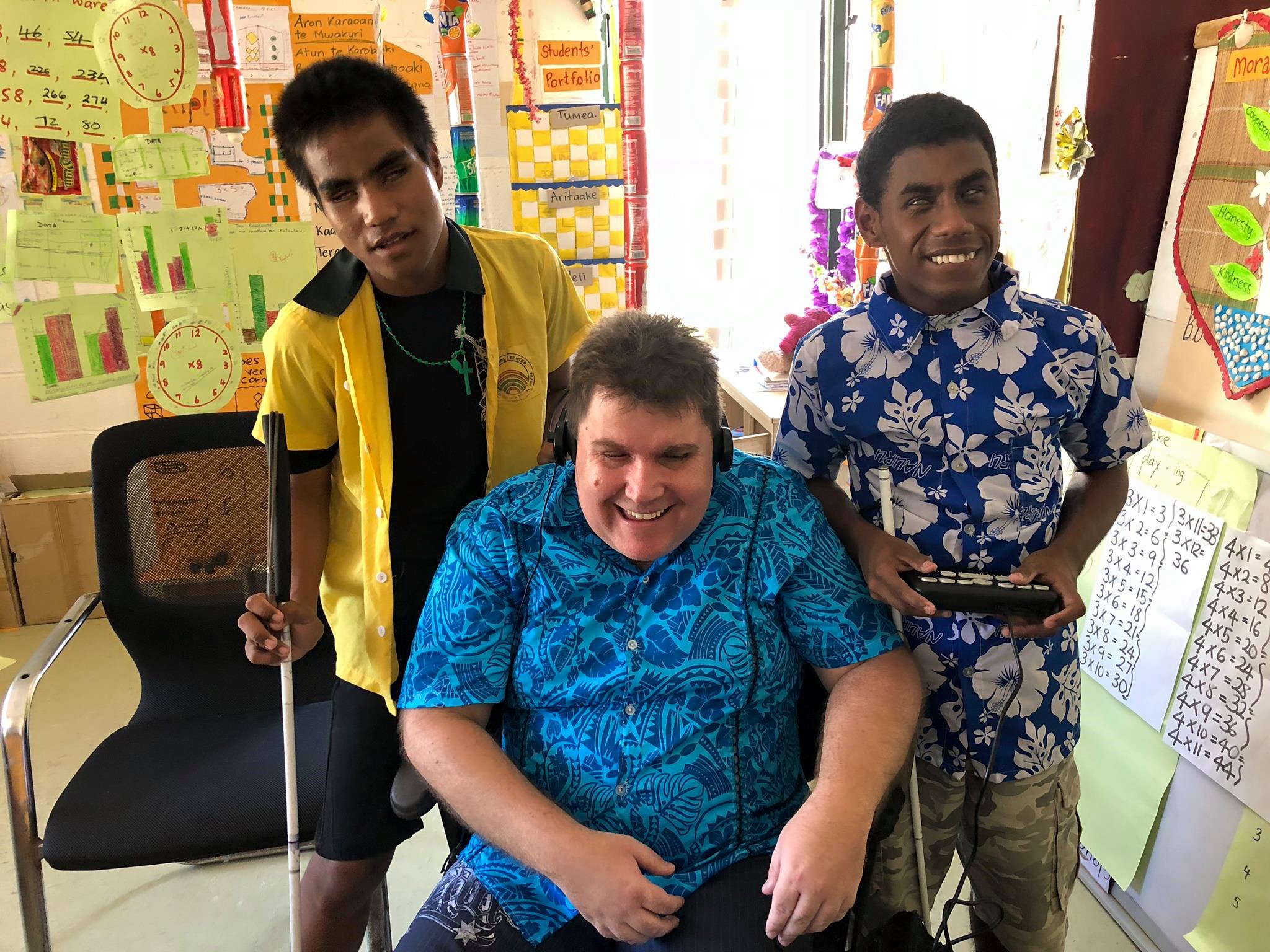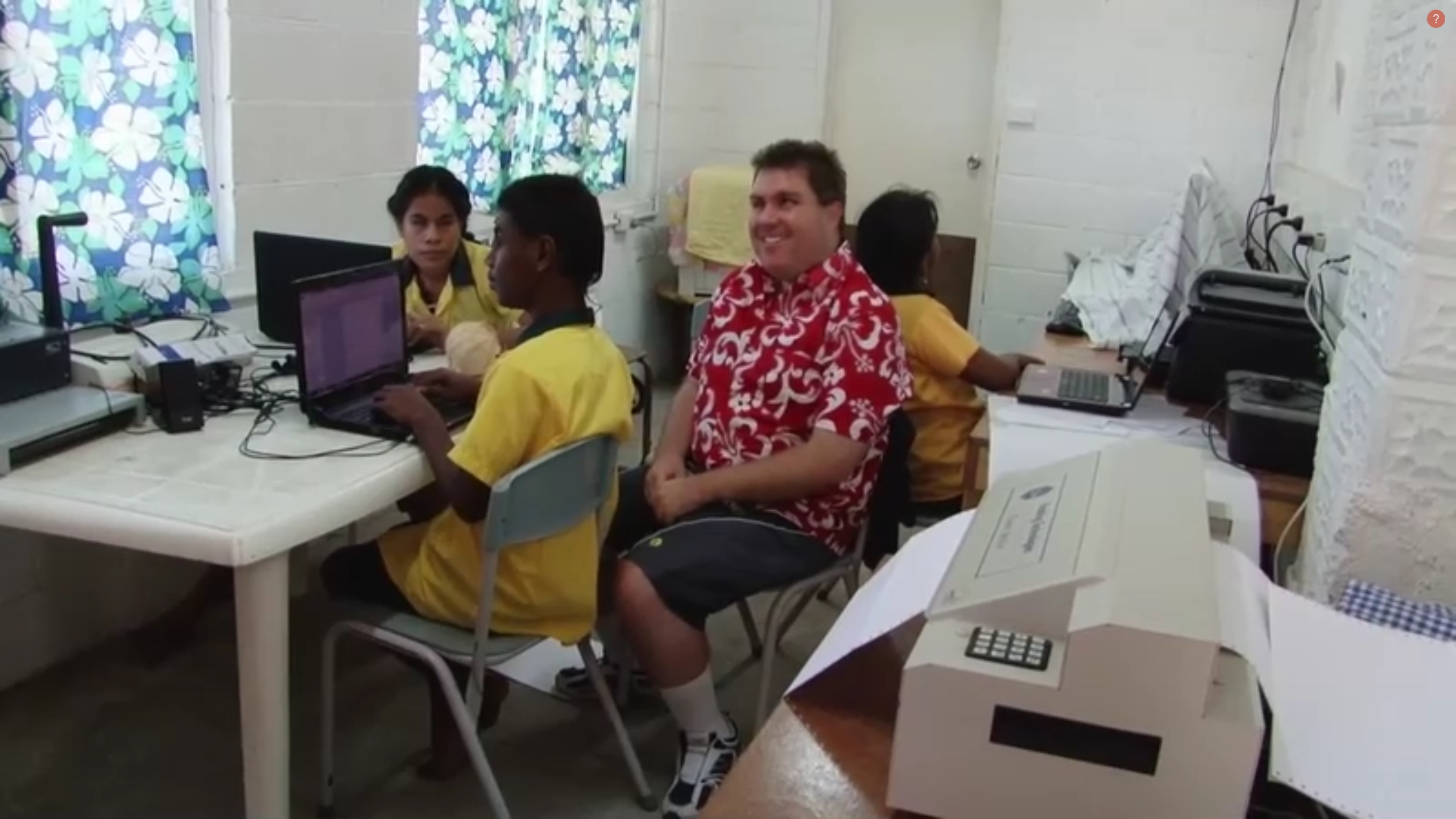Recently, six blind students graduated with Information & Communication Technology (ICT) qualifications on Kiribati. They attribute their success to the great assistance of NVDA. Ben Clare, an Inclusive Education Advisor helped bring NVDA to Kiribati. We are very proud to be able to share some of the work done using NVDA on Kiribati with you.

The Republic of Kiribati is in Micronesia in the middle of the Pacific Ocean. South of Hawaii, the island nation straddles both the equator and the 180th Meridian. The International dateline deviates around Micronesia. This means Kiribati’s easternmost islands have the most advanced time on earth of GMT +14.
Ben Clare works throughout the Pacific. He delivers assistive technology workshops to individuals and disabled people’s organisations. Ben’s teaching ranges from touch typing, through to application building and advanced mathematics. “All using NVDA, of course”, adds Ben, who is an NVDA user himself and has long been an advocate of NV Access.
The Republic of Kiribati is one of the poorest and least developed nations in the Pacific. Access to education generally is a challenge, let alone for people with disabilities. The Kiribati School and Centre for Children with Special Needs is in the capital city of South Tarawa. It is the only facility catering for people with a disability in Kiribati and is making a big difference. The school has over 250 students with varying disabilities. About 25 of the school’s students are blind or have low vision.

Ben Clare with students in Kiribati
In recent years, the School has begun to roll out the standard Kiribati curriculum. This results in students learning the same as those attending regular school. Inclusive education is also embraced in mainstream schools. Hearing and vision-impaired students are integrating and achieving great exam results. One such successful student who is totally blind uses NVDA daily. Ben Clare taught him NVDA during his time as a full-time volunteer at the school. NVDA runs on a laptop to complete school assignments, homework and Internet research. Students find NVDA to be a highly reliable assistive technology. It is sometimes necessary to access computers located in the school laboratory. NVDA being portable and transferable is ideal for this work. NVDA is having such a positive impact in countries like Kiribati. Purchasing expensive software licenses is not possible. This is partly due to it not being affordable. Lack of available computers also means licenses would often need to be transferred. Being available at no cost means that NVDA totally solves this problem. NVDA also works with all the standard software the school uses, such as Microsoft Office. The ongoing work that Microsoft does to ensure the Accessibility of Microsoft Office ensures it is useable by all. This student is thriving as a result, coming in the top 5 per cent for his form 6 results. He is currently well on the way to completing form 7.
NVDA is also having a positive impact on other blind students from the Kiribati School. Six students recently graduated from Kiribati Institute of Technology. The group all completed a diploma in ICT and Office Management. These are the first students with a disability to graduate from the Institute. They are also the first students with a disability to gain a qualification without having to leave the country. Again, NVDA was integral in this. At first, the students undertook classes on how to use assistive technology. They then went on to do regular subjects such as using Microsoft Word and browsing the Internet. All the PCs at the college are equipped with NVDA. The students utilised headphones to hear the voice output. At first, it took a little while for them to understand the synthetic speech. Once they got the hang of the technology, they progressed at the same pace as their sighted peers.
Since the introduction of NVDA, it has had an enormous and positive impact on access to computers. This is especially true for people in developing countries. The effect is even greater when paired with Braille. To go with NVDA, Ben also recently gifted an Orbit Reader 20 to the Kiribati school. This refreshable Braille device enables access to Braille literacy everywhere, anywhere. The Orbit Reader can connect to a standard PC where the contents of the screen are output in Braille. Documents can be stored on an SD card inside the device, to read without a PC connection. NVDA is opening study and employment opportunities that were a pipe dream only a short time ago!

Ben Clare working with students
After this successful trip to Kiribati, Ben Clare is travelling to Tonga next. He is donating a laptop with NVDA to the Tonga Vision Impairment Association. The association has only recently formed, and Ben will also run a training workshop for staff. Following his visit, the staff will train other members. The Association will also use NVDA to operate their new Index Braille embosser.
Ben is also working with a student from the Solomon Islands who is studying Law in Fiji. He is currently in 4th year and will be the first lawyer in the Solomon Islands who is blind or vision impaired. He often credits the success he has to his ability to use the computer with NVDA. New opportunities are being created all over the pacific, and we are thrilled that NVDA can play a part!
If you know an organisation or an individual who would benefit from NVDA, please spread the word – it costs nothing to Download NVDA, after all! If you are considering NVDA for a company or government, please see our Corporate and Government page which has lots of useful information on regulatory compliance, the license agreement, security and much more.
If you have a story you’d like to share with us, please do Email us!